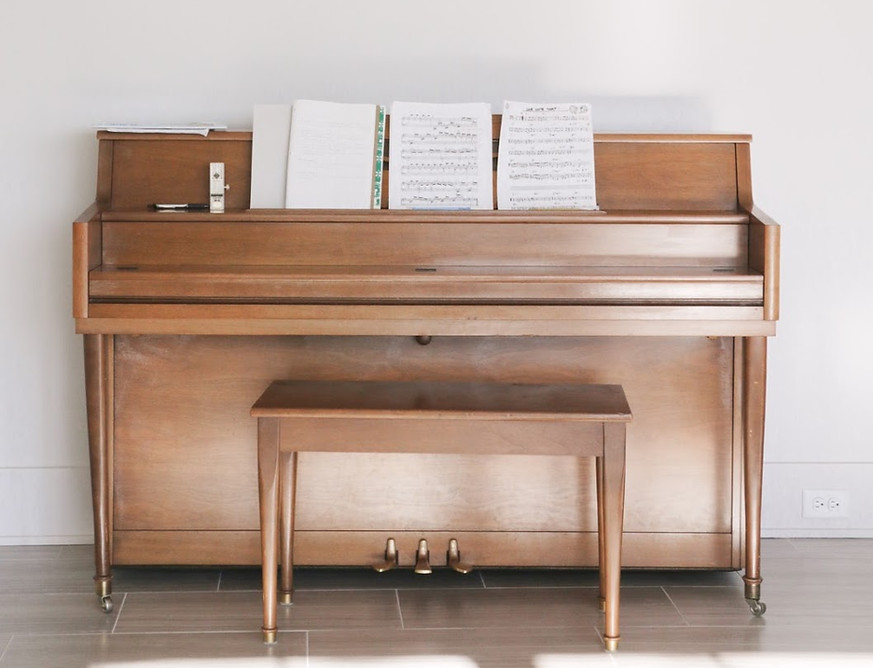Which piano should I get?
Buying a piano for the first time is an exciting and special moment for the aspiring musician. A good piano can be a lifelong musical companion. This article explains the difference between acoustic pianos and digital pianos, the overall advantage of acoustic pianos, where to buy a piano and how to look after it. There are two types of acoustic piano: upright and grand pianos. This article focusses on upright pianos, which are smaller and less costly than grand pianos.

Acoustic vs. Digital
The main difference between an acoustic piano and a digital piano is the mechanism that produces the sound. An acoustic piano makes a sound when felted hammers strike steel and copper-wound strings. The vibrations produced by the strings are amplified by the wooden soundboard. The resonance of the strings creates a unique and genuine sound of infinite tonal variety. Digital pianos have no strings. An electronic tone generator produces a pre-recorded sound, which is amplified by a speaker. They mimic the key action of an acoustic piano by having weighted keys, graded hammer action, and simulated escapement mechanisms. The best digital pianos may come close to replicating the feel of an acoustic piano, however there are still noticeable differences in touch sensitivity and response. They also have settings such as volume control, built-in recording and playback, and a metronome.
Full-compass digital pianos (88 weighted keys) tend to be smaller than acoustic pianos, however modern upright acoustic pianos (as opposed to very large grand pianos) are quite compact, measuring roughly 5’ wide by 3’9” tall by 2’ deep.
Practising on an acoustic piano at home is a beautiful and rewarding experience. Furthermore it allows the pianist to refine his playing and develop a better technique. Concert and exam venues almost always provide an acoustic grand piano. Pianists who practise on acoustic pianos are at an advantage when they play a grand piano in a concert or exam.
Which make and where to buy
The best (and most expensive) pianos are made by German makers Steinway & Sons, Bechstein, Blüthner and Bösendorfer. Yamaha, Fazioli, Feurich and Kawai also make excellent pianos. More affordable high quality instruments also include makes such as Kemble, Knight and Samick, though there are many more. Second-hand pianos, even those which are a few decades old, can be an excellent investment for a student pianist, but they must be bought from a reputable piano dealer who has had them approved by a piano technician. There are many very cheap instruments on eBay and other such websites, which may be in good condition to the eye, but will serve as little more than an expensive lump of furniture. Second-hand pianos start at about £1,500 to buy. You could also rent a piano starting at £45 per month. We highly recommend going to a piano showroom or dealership to ask more questions and try out some pianos. Piano Lobby is an excellent local business. The owner, Julian Barber, is very friendly and will gladly help you when buying or renting a piano.
The leading brands of digital pianos are Yamaha, Kawai, Roland, Korg, Casio. Prices start at £320 for an entry level keyboard. Bonners Music Shop has a wide range of digital and acoustic pianos.
Looking after a piano
Acoustic pianos will very slowly go out of tune over the course of months. This is caused by the weather and humidity, which is affected by temperature variation. A piano should not be put in front of a radiator. You will need a piano tuner to tune the piano roughly every six months. Piano Lobby include the first tuning for free. Some pianos may develop very minor imperfections in the sound, such as hammers double-striking (‘bubbling’), or squeaks and creaks. These can usually be fixed very easily by your piano tuner. Digital Pianos do not need to be tuned and are easier to transport.
We would be very pleased to discuss buying a piano with you individually.
Do feel free to get in touch.
